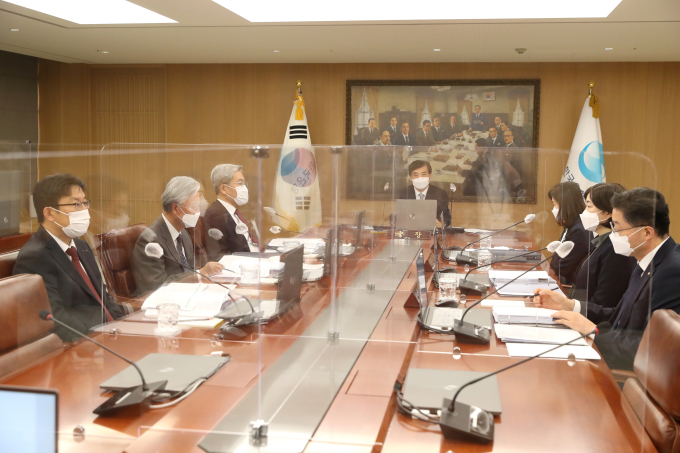BOK announces direction of monetary credit policy operation in 2021
“Maintaining the easing monetary stance next year, paying attention to financial imbalances”
[서울=뉴스핌] Reporter Baek Ji-hyun = The Bank of Korea has announced that it will maintain its easing monetary policy stance next year and take greater care of financial imbalances such as debt increase.
The BOK announced on the 25th that it plans to maintain an easing stance to support the recovery of the growth rate and stabilize the inflation rate at the target level of 2% through the ‘2021 Monetary Credit Policy Operation Direction’. The BOK said that the domestic economy is expected to recover gradually, but it has considered the high uncertainties surrounding the future growth path, such as the extent of the spread of Corona 19 at home and abroad, and the timing of vaccine commercialization.
 |
| [서울=뉴스핌] Reporter Baek Ji-hyun = Bank of Korea governor Lee Ju-yeol presides over the meeting at the Financial Monetary Commission plenary meeting held at the Bank of Korea in Jung-gu, Seoul on the morning of the 26th. [사진=한국은행]2020.11.26 [email protected] |
In response to the financial and economic shocks caused by Corona 19 this year, the BOK sharply cut the base rate by 125bp (1bp = 0.01%p). Accordingly, the benchmark interest rate is at a record low of 0.50% over the past 7 months.
In addition, the BOK announced that it would be more careful about the risk of accumulating financial imbalances. In recent years, amid the low interest rate trend, the flow of funds to the asset market such as real estate and stocks has appeared, and household and corporate loans have increased, raising concerns about financial imbalances. According to the Financial Stability Report for the second half of the year released by the BOK on the 24th, the ratio of household credit to nominal GDP as of the third quarter was 101.1%, exceeding 100% for the first time in history. The BOK announced that it will reinforce the early warning function to prevent potential risks in the financial system from becoming present while promoting the stability of the financial and foreign exchange markets.
The economic growth rate for next year is expected to be around 3%. However, the uncertainty of the growth path was evaluated as still high. With exports continuing to improve on the back of the global economy and trade recovery, facility investment is expected to continue and the sluggish construction investment will gradually ease. Private consumption is expected to recover slowly due to the prolonged COVID-19 outbreak. In terms of employment, sluggishness is expected to ease along with the recovery of the domestic economy, but recovery is likely to be modest and differentiated by division.
The consumer inflation rate is forecast to be around 1%. The inflation rate will be higher than the previous year due to the improvement of the domestic economy, the base effect from the decline in international oil prices during the previous year, and the rise of jeon and monthly rents, but it is still difficult to reach the target level (2%) due to low demand pressure.
Meanwhile, the BOK announced that it plans to reexamine its monetary policy operation system and seek ways to improve it in response to the demand for the central bank to expand its role. In particular, regarding the proposal to add employment security to the purpose of establishing the BOK, he said that he would prepare a plan suitable for the situation in Korea by referring to cases of central banks in major countries and opinions of external experts.
